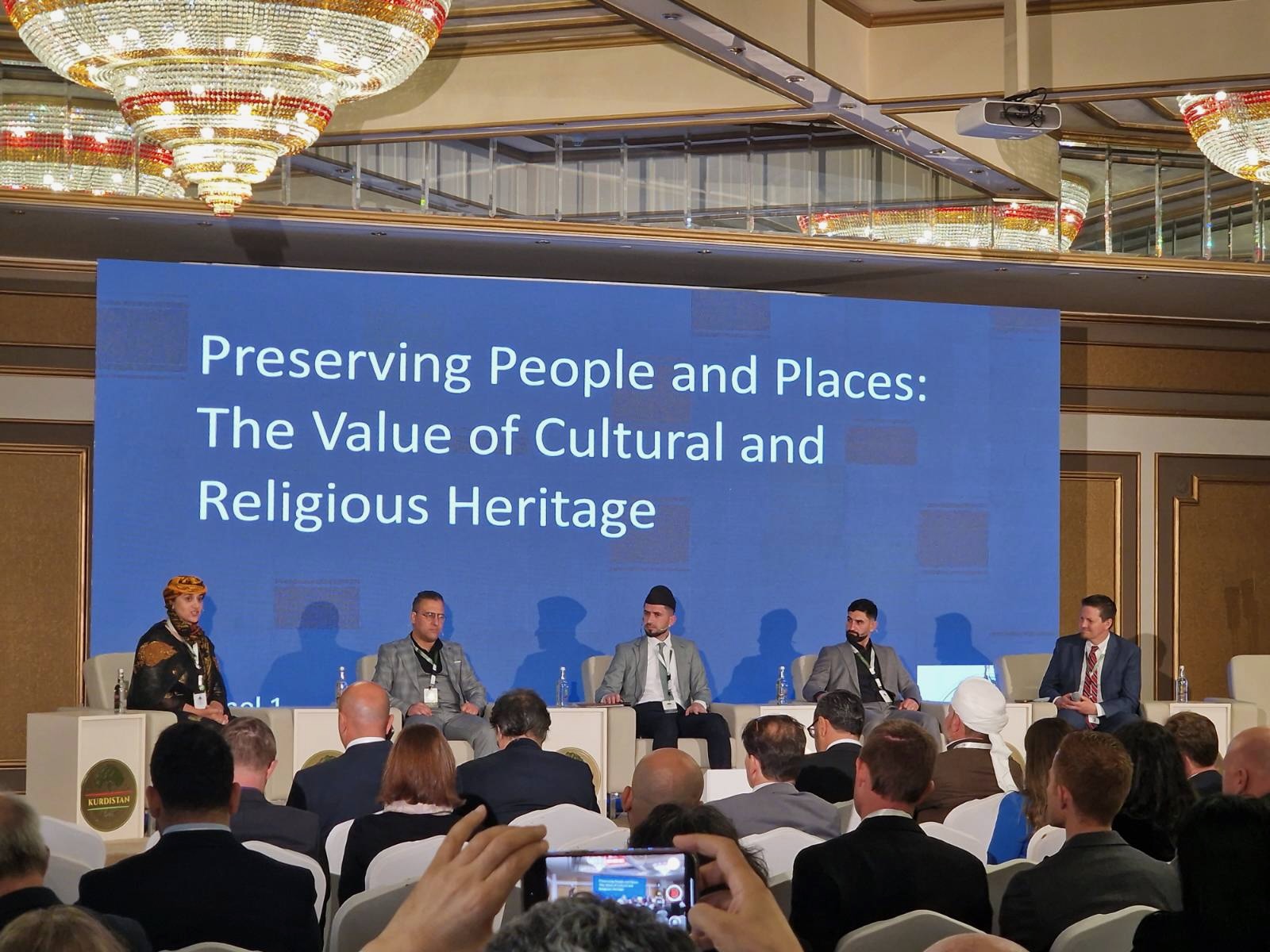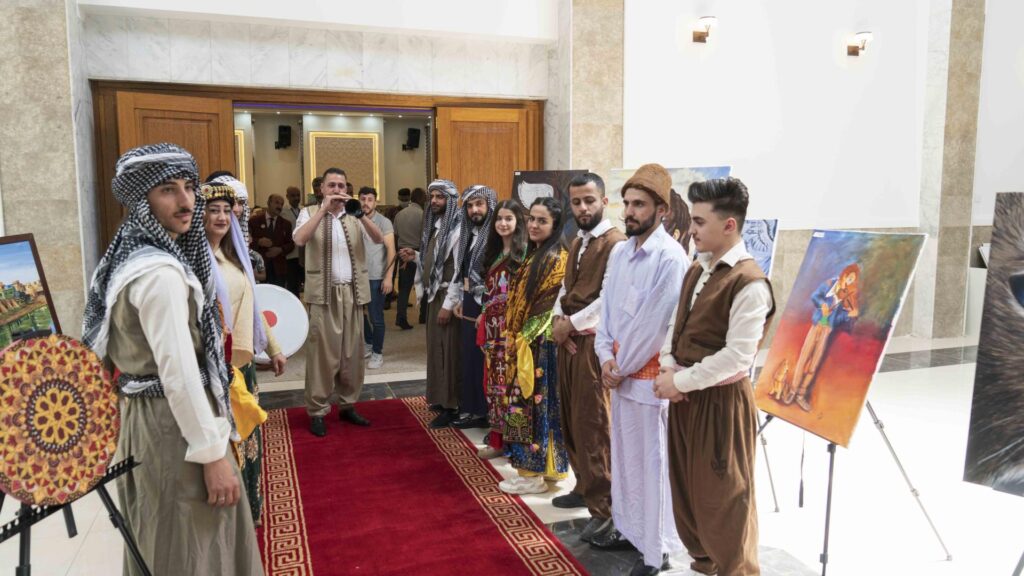The first-ever Papal visit to Iraq on March 5-8, 2021 was largely met with celebration as he pursued a mission of solidarity with persecuted Christians and other minorities and sought to elevate a mission of tolerance and coexistence among Christians and Muslims in Iraq, the Middle East and around the globe. The trip was replete with symbolism from the historic meeting with Grand Ayatollah Ali al-Sistani, to an interfaith gathering in Ur, and prayer services amongst the ruins of Mosul, with the reviving community of Qaraqosh, a celebration of mass in Erbil, and high-level delegations in Baghdad and Erbil, and overwhelmingly positive receptions by crowds along the way.
Yet for the celebrations to translate into meaningful changes will require far more than symbolic gestures. The security situation remains fraught, justice for genocide survivors has been limited, meaningful political representation for all Iraqis is still in question, and the unequal economic opportunities and basic services have inspired waves of protests in recent months.
In this Cornerstone Forum series, contributors were asked to consider: Does the Pope’s visit provide an opportunity for meaningful steps to be taken? What practical steps could be taken to translate the goodwill of the Pope’s visit into tangible progress in addressing the fundamental issues impacting Iraqis of all religious communities? What roles should international NGOs, religious actors, and multi-lateral organizations take to support positive developments for a more just and flourishing society?

If we wish to prevent Iraq’s indigenous communities from being permanently erased from their lands, much needs to be done. This was highlighted during Pope Francis’ pilgrimage of peace. The spring visit of the Pope to Iraq has focused increased global attention on the dire situation facing Iraq’s religious minorities, especially the Christians and Yezidis, and rightly so. The Yezidis of Iraq supported this visit. However, to move beyond celebration and fanfare to meaningful change in the daily lives of Iraq’s minorities, a number of difficult issues must be addressed. It was positive and heartwarming to see many elements of Iraqi society embrace the conceptual idea of religious tolerance, openness, and coexistence. In order for the idea to take hold, concrete steps must be implemented.
Laws & Awareness
The first and fundamental application of the coexistence and equal rights in Iraq that was celebrated during Pope Francis’ visit could be the establishment of a civil legal system that is not tied to any one religion but focuses on the equal human rights of all. Religious minorities do not have a problem with other religions; the problem is when other religions diminish our rights. Iraqi national legislation and personal status laws are heavily influenced by one religion; even the Iraqi flag is heavily influenced by one religion. For Iraq to be a state where religious minorities can live safely and peacefully, there must be equal protections based on fundamental and equal rights of all citizens, Muslims and non-Muslims alike. These are not minor legal details. The first step for Iraq to be a successful multi-cultural and multi-religious state is for human rights to extend fully and equally to all.
At a more lay level, Iraqi citizens must be better educated about the variety of the country’s cultures and religions. Yezidis suffer from the inaccurate and painful accusation of being “devil-worshippers,” cast aside as inferior for discriminatory reasons. In one instance, at an NGO that will remain unnamed, Muslim managers refused to eat food made by the hands of Yezidi beneficiaries. This is the sad truth. With this hatred and discrimination, life in the country is challenging. At worst, these tendencies lead to violence from groups like Al-Qaeda or ISIS. Iraqi religious minorities like Yezidis, Christians, Kakai, Sabaean, and others suffer from discrimination in different ways. This begins with ignorance and lack of education. In that regard, the well-publicized visit of the Pope could have a positive impact. Building on this, students should receive mandatory Iraqi religious and cultural education where children are taught about Iraq’s people. This may not be easy but is necessary if religious minorities are to have a future in Iraq. Years ago, there was a significant Jewish population in Iraq. They are now all gone. The Christian population has dwindled to about 10% of what it used to be. Yezidis have left Iraq in record numbers since ISIS committed genocide against our people. Without serious, nation-wide efforts to educate Iraqis about its religious minorities, they may all be gone one day. Alternatively, if Iraqi children were taught that all citizens had equal and fundamental rights, including non-Muslims, that might open a new worldview and mindset for future generations.
Education & Employment
In practical terms, religious minorities also need access to education and employment opportunities. This is a particularly acute crisis for the Yezidi community, which has consistently been excluded. In certain cases, discriminatory procedures lead to Yezidis not being considered for jobs or university slots. Simple, obvious religious discrimination. In other cases, it is different. Several years before the emergence of ISIS, a number of Yezidi students from Sinjar were enrolled in the University of Mosul. They suffered harassment, and at one point, locals in Mosul threatened to stop them from attending. Sadly, they executed the Yezidi bus driver who brought the Yezidi students to the university. After that, the students did indeed stop attending, and were thereby deprived of the chance of a university education. This type of discrimination and harassment happens regularly and is the root cause for the suffering of religious minorities. Most Yezidi families have traditionally gotten by through basic, subsistence farming. Most have not benefited from educational, technological, and modern economic growth and opportunity. To be fair, there are many communities in Iraq that struggle in their own ways. And Iraq has suffered from corruption and unfair practices that affect all citizens, not only minorities. But for too long, religious minorities have received the least share and the fewest opportunities.
The visit of Pope Francis revealed some appetite, at least superficially, for brotherhood and peaceful coexistence in Iraqi society. Success would mean translating this spirit into daily practice. Let Iraq encourage local and international companies to pro-actively hire minorities when possible, especially in Nineveh and Duhok provinces. Let all Iraqi universities reserve a percentage of seats for religious minorities, and even provide scholarships to the extent possible. Let UN and foreign aid schemes that provide skills and trainings to Iraqi citizens and government officials include clauses to ensure minority participation. Let Iraq allocate a percentage of its budget to targeted efforts to preserve and protect religious minority communities, according to the communities’ wishes, to ensure they are not completely erased from the Iraqi population.
In the aftermath of ISIS, there are other particular needs. For Yezidis, the reconstruction of Sinjar is a top priority, which would ostensibly facilitate return of the population to its area of origin. For Christians, locations in the Nineveh plains and Christian-majority towns need to be rebuilt and services restarted. Other minority populations have their own towns and associated requirements. However, we must bear in mind that reconstruction is only part of the solution. Prior to 2014, Yezidis in Sinjar were already suffering from serious problems, including high rates of suicide and lack of employment. Discrimination and the ‘othering’ of Yezidis and religious minorities did not begin with ISIS, and it has not ended with the military defeat of the caliphate. Aside from the fact that many ISIS members still exist in Syria and Iraq, the mentality and the ignorant hatred that ISIS capitalized on has not vanished. Hatred, discrimination, and lack of opportunity greatly harm the future of religious minorities in Iraq. Religious minorities often remain economically dependent and isolated, politically disenfranchised and under-represented, and with least access to education. Reconstruction of the homelands is an important aspect, but trauma treatment, equal opportunity, and economic empowerment through education and skill-building are just as critical.
Security & Justice
The Free Yezidi Foundation enthusiastically supported the visit of Pope Francis. Our fellow Iraqi Christians are aware of the Yezidi community and the importance of mutual support among religious minorities. This visit was meaningful for a reduced and badly damaged Iraqi Christian community. Yezidis stand in solidarity with Iraqi Christians. This visit was also meaningful for Yezidis, and we appreciate Pope Francis highlighting the plight of Yezidis.
Following the Yezidi genocide, the future of Sinjar and the Christian and religious mino
rity homelands cannot be improved without a stable security architecture. Various forces in Iraq and from abroad have their own interests in these lands, and often the inhabitants are considered last. This is outrageous. The voices of religious minorities should be the primary deciding factor in the management of these areas. Security reform should be such that the local population feels safe, not the interests of various political forces. If we are serious for a better future for religious minorities in Iraq, this must be resolved. Similarly, victimized communities deserve justice. The perpetrators of these crimes have not faced justice in a meaningful way. ISIS murderers and rapists still live in Iraq and Syria. Trials are not conducted in a serious manner and seem beyond the capacity of Iraq’s judicial bodies.
Yezidis and other religious minorities are not seeking charity, but to enjoy fundamental rights as citizens of a country to which they should belong as equals.
Role of the International Community
In light of these serious challenges, we call upon the international community and global religious leaders to celebrate the visit of Pope Francis to Iraq, but to also consider deep-rooted challenges that face religious minorities in the country. Support to minority civil society is essential. Advancing broad and sweeping civil rights for all Iraqi citizens is necessary. And publicly promoting and supporting the equal rights and equal opportunity for Iraqi individuals, regardless of religious affiliation, can help capitalize on the genuine and seemingly heartfelt reception that Pope Francis received, with a view to translating this spirit into tangible progress for religious tolerance and freedom in Iraq.
Pari Ibrahim is the Founder and Executive Director of the Free Yezidi Foundation. She studied law at the University of Amsterdam and works to promote the rights of the Yezidi minority community in Iraq, with a particular focus on women’s rights and gender issues.
All views and opinions presented in this essay are solely those of the author and publication on Cornerstone does not represent an endorsement or agreement from the Religious Freedom Institute or its leadership.
THE RFI BLOG

Largest Longitudinal Study of Human Flourishing Ever Shows Religion’s Importance

Keys To Human Flourishing: Faith And Relationships Outweigh Wealth

RFI Champions Religious Freedom at Kurdistan’s First National Prayer Breakfast

RFI’s Ismail Royer Speaks at Supreme Court Rally for Religious Parents Seeking Opt-Out

Addressing the Precarious Religious Freedom in Iraq
CORNERSTONE FORUM

Reaffirming Religious Freedom: Bridging U.S. Advocacy and Iraq’s Constitutional Framework

Political Polarization, Same-Sex Marriage and Religious Liberty

Bridging the Gap Between International Efforts and Local Realities: Advancing Religious Freedom in the MENA Region

Challenges to Religious Freedom in Iraq and the Critical Need for Action

